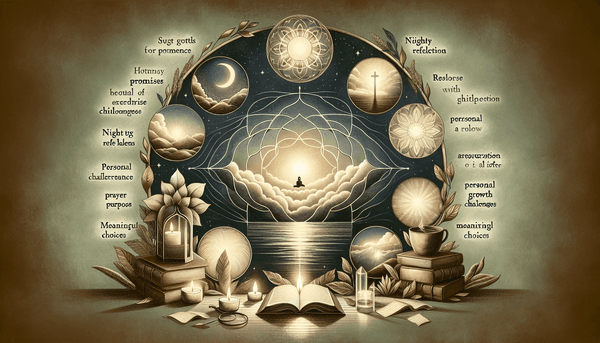The Pursuit of Wisdom and Knowledge
Ecclesiastes 1:16-18 captures the voice of the Teacher, who has sought wisdom and knowledge only to discover that with great understanding comes great vexation. This sobering realization points to the limitations of human wisdom and the toil involved in chasing after it, akin to 'striving after wind.' The quest for wisdom often leads to a recognition that the world is complex and enigmatic, and that our grasp on true knowledge is tenuous at best. As we navigate this pursuit, we can turn to Proverbs 4:7 which reminds us that wisdom is paramount, warranting our utmost effort to obtain understanding. Yet, we must balance our search for knowledge with humility, as emphasized by James 3:13, which praises the deeds done in the humility that comes from wisdom. The pursuit of wisdom, according to the Bible, is not just about acquiring facts, but about living a life that reflects God's character, as seen in 1 Corinthians 1:25 and Job 28:28, where wisdom is equated with the fear of the Lord and the shunning of evil.
Conclusion
The wisdom of the Bible remains ever relevant, guiding us through the complexities of life with enduring truths. This exploration of biblical passages has highlighted the multifaceted nature of wisdom, the depth of love, the reality of spiritual warfare, and the challenges of personal struggles. As we reflect on these themes, may we be encouraged to delve deeper into the Scriptures, seeking the wisdom that leads to life, the love that binds us together, and the strength to stand firm against the trials we face. For those interested in further exploring how scripture guides our daily conduct, consider reading about modesty, speech, and peace from a biblical perspective. Let us remember that, amidst the challenges, there is hope and transformation to be found in the transformative power of God's Word, which continues to speak into our lives with clarity and purpose.
FAQ
Q: What does Ecclesiastes 1:16-18 mean?
A: Ecclesiastes 1:16-18 reflects on the pursuit of wisdom and knowledge, and the realization that increased wisdom can lead to increased sorrow and vexation. It suggests that human understanding has its limitations and that the pursuit of knowledge can be as futile as chasing the wind.
Q: What's a verse to give to my boyfriend?
A: You can share 1 Corinthians 13:4-7 with your boyfriend: \"Love is patient, love is kind. It does not envy, it does not boast, it is not proud. It does not dishonor others, it is not self-seeking, it is not easily angered, it keeps no record of wrongs. Love does not delight in evil but rejoices with the truth. It always protects, always trusts, always hopes, always perseveres.\"
Q: What's a verse to call my husband handsome?
A: Although the Bible does not directly call a husband 'handsome,' you can express admiration with Song of Solomon 1:15: \"How beautiful you are, my darling! Oh, how beautiful! Your eyes are doves.\" This verse celebrates beauty in a romantic context.
Q: Can you explain Revelation 12:17?
A: Revelation 12:17 is part of a vision that depicts the spiritual battle between the forces of evil, represented by the dragon, and the followers of Jesus. It highlights the importance of faithfulness and perseverance in the face of opposition and persecution.






